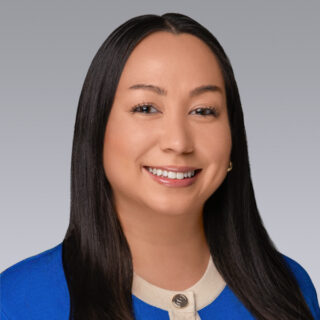To close out Women’s History Month, Anjee Solanki interviews Jazmen Johnson, Vice President, Diversity, Equity & Inclusion, ICSC, to discuss CRE career pathing and how DEI best practices can advance the industry into the 21st century.
Jazmen Johnson has strengthened diversity and inclusion efforts across the commercial real estate industry. One of her crowning achievements is the success of ICSC’s Launch Academy, which provides summer internship opportunities for undergraduate students from historically underrepresented backgrounds to learn more about developing and managing commercial real estate marketplaces and spaces.
Anjee: Jazmen, tell us about your career path in commercial real estate and retail real estate.
Jazmen: Before joining ICSC, I worked in public policy with an organization that supported underserved communities and youth in urban retail deserts. Although this experience was not directly related to commercial real estate, it provided me with some adjacent knowledge. My closest interaction with retail real estate was when I worked in retail, where I interacted with the industry daily.
Anjee: What was the impetus for establishing the Launch Academy?
Jazmen: Commercial real estate wasn’t on my radar in college, and we’ve found that it’s not a track that many students are aware of either.
The Launch Academy aims to change that. We wanted to create a program for students to learn about commercial real estate and the different career paths available and connect them to industry professionals. We have a versatile cohort of students—philosophy and business majors who have never heard of retail real estate. The program teaches them how to apply the skills they are currently learning or the degree they’re presently pursuing so that they are transferable to the industry. The exposure alone is enough to get them excited about commercial real estate, and in the three years since we started, several students have been employed full-time by our members.
Anjee: If you had been exposed to commercial real estate, what career track would you have considered?
Jazmen: Property management. I love how the segment touches every aspect of the industry, serving as a communications hub for its stakeholders and contributors.
Anjee: What drives your passion and advocacy for diversity and inclusion within CRE?
Jazmen: I wouldn’t be where I am today without the support of those who committed to paving the way. They opened doors, fostered connections, and provided invaluable education and guidance. I know firsthand the risk of being overlooked.
We need to normalize DEI practices within the company culture to ensure we tap into the full potential of the vast pool of often overlooked and untapped talent. That shift alone will drive our industry forward and make it stronger and more inclusive.
Anjee: How has the industry changed since you started?
Jazmen: We’re seeing more diversity in the C-Suite, although there’s still more work to do. But just as important, there are more DEI champions and people from all walks of life supporting and moving our mission forward. These DEI champions proactively share messaging and hold their peers accountable for doing what needs to be done in the space.
While we are seeing some pull back, many of our members continue to strive to do better and commit to continuing to hire women and people of color and creating opportunities to build out diversity initiatives.
Everyone is trying to figure out what lies ahead with affirmative action and how it will impact how companies hire and develop their staff internally.
Anjee: How does ICSC support DEI initiatives in the industry?
Jazmen: ICSC is a member organization, and we are here to support our members in their business efforts, from finding a tenant to establishing DEI practices. We proactively consider what will directly impact our members and how they conduct business. We constantly communicate with members, listening to what’s happening on the ground, how it’s affecting their work, amid their challenges and successes. All of our DEI initiatives are member-driven, and in tuning into those conversations, my team and I can support our members as they navigate.
I am always thinking about how ICSC can become a leader in inclusion, modeling the behaviors needed to advance DEI across the industry. Our team is committed to enhancing diverse representation on our panels and within our volunteer leadership structure. Our mission is to promote women and professionals from other historically underrepresented groups as subject matter experts, speaking about industry topics and not relegated to only touching upon those issues that impact women.
Anjee: The nextGen of workers are very attuned to a fast-paced culture and immediate gratification. How can the industry pivot to attract young talent?
Jazmen: Younger generations bring a different approach to work, and as an industry, we have to be able to adapt. When engaging with young talent, fostering a supportive environment and providing mentorship that empowers young professionals to achieve their goals and contribute meaningfully are essential.
For the industry, it’s recognizing that it takes time to effect change. We must continually lead the charge to promote diversity, equity, and inclusion, concepts infused in the younger generation’s DNA that are integral to how they function and live.
Anjee: How can CRE adapt to the younger generation’s mindset?
Jazmen: Our society’s demographics are changing. We can only respond to others’ needs and be truly inclusive when everyone is seated at the table to guide our decisions. It is a business imperative to make that happen because the younger generation expects to be included in these spaces. They expect to see themselves reflected in the spaces where they shop and spend their time. If we’re not able to do that in a meaningful way, we run the risk of losing customers.
Anjee: Does a particular moment stand out as representing the nextGen perspective on DEI?
Jazmen: Last year, we brought the students to ICSC Las Vegas, where they applied their learnings in real life. It was inspiring to witness this nucleus of students experiencing ICSC together, networking with industry professionals, and introducing and elevating each other to their peers. When asked about the importance of diversity, they were able to answer the question, articulating its value and how to affect it. They were modeling behaviors the industry should aspire to.
Another example is CourtneyMercadel, a Howard University student who participated in a panel discussion and shared her experience as an intern where she was the only person of color and woman in a male-dominated industry. Instead of seeing it as a weakness, Courtney reframed it as a challenge, “I saw it as a strength because I brought something to the table that nobody else could.” Empowering young people like Courtney to recognize the differentiated value they bring to the conversation and pursue opportunities to contribute their talent motivates my work.
Anjee: What do you think is the greatest challenge in welcoming the nextGen to CRE?
Jazmen: First and foremost is exposure. For many of our students, the Launch Academy is the first time they’re aware that retail real estate exists.
As an industry we need to reassess our hiring practices. We frequently encounter hiring managers seeking a one-size-fits-all candidate, a mindset that often disregards exceptional talent. We have to consider the value of transferable skills and their potential application in our industry. Recognizing the opportunity to develop young talent who may not have the exposure or experience, but exhibit skill, grit, and the desire to learn is monumental.
Anjee: I couldn’t agree more. This is not a check the box type of environment, we have to be aware of where people lean in naturally, and how we can cultivate and build upon their existing skill set.
Jazmen: Exactly. It’s so important to give people an opportunity. Internships are a low-risk opportunity that a company can offer a young person to learn through mentorship and shared experiences.
There is a misconception that mentorships require a lot of time and effort from the CRE professional. It’s a matter of perspective, because even the small commitments can make a huge difference in the life of a mentee. We instill the importance of mentorship as a two-way street, and Anjee as you know, there’s an opportunity for everyone–mentors and mentees, to benefit in those relationships.
Anjee: What untapped talent have interns shown that will be the most impactful for CRE?
Jazmen: The nextGen brings a unique blend of characteristics that will fuel innovation within the industry. I’m seeing a lot of entrepreneurial drive and curiosity in how younger generations approach the work. Many of our students are also empowered to self-advocate. For example, last year, we started to see many interns renegotiating their hourly summer wages, which required an education on our part to explain the ins and outs of budgeting and planning. We updated our curriculum to include salary and commission-based programming to help them better understand the process.
Anjee: Any final thoughts on diversity and inclusion?
Jazmen: It’s important to understand that diversity extends beyond gender and race. We need to consistently create inclusive environments where everyone’s unique perspectives and experiences are valued. This includes the wisdom of our senior leaders and industry veterans. We can create a powerful brain trust that drives innovation and growth, leveraging the collective knowledge of all generations to build a better future for our industry.
Anjee: What advice would you give to someone entering the industry today?
Jazmen: I cannot stress enough the importance of networking and taking advantage of every opportunity to build relationships and genuine connections, educate yourself, and gain experience. Every position has the potential to be a launching pad for gaining valuable experience and knowledge to inform your career path. Try to remember that what initially interests you might change as you gain exposure to different aspects of the field.
Anjee: How do you maintain your work-life balance?
Jazmen: Although I’m not the best at taking time out for myself, I’m working toward being more disciplined about carving out time for the things important to me. I am careful and intentional about setting boundaries between my work and home life. For instance, when my son comes home from school, I pause my work to spend that time with him. It helps to have support at home. My husband encourages me to seek things outside of being Caleb’s mom and working. I know that it’s necessary for my mental health to take time away for myself.
Anjee: One final question. If you could be any brand what would it be?
Jazmen: Diane Von Furstenberg, classic and timeless.
To find out more about ICSC’s Launch Academy, and how to get involved, click here.
*This interview has been edited for length and clarity.

 Anjee Solanki
Anjee Solanki

 Nicole Larson
Nicole Larson
